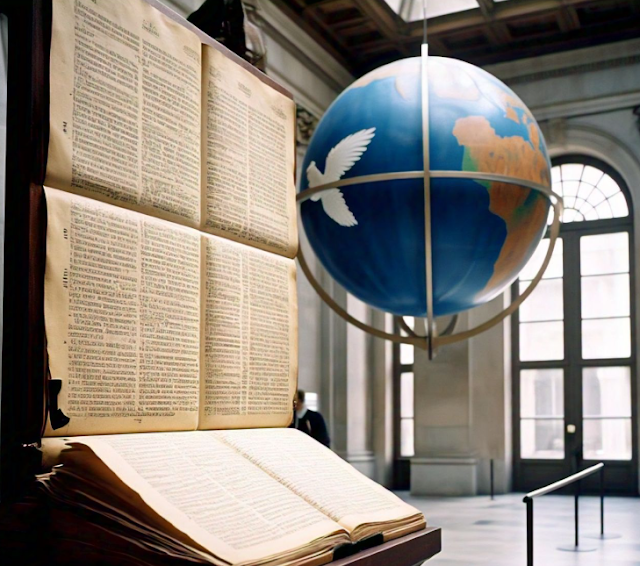
The Magna Carta, signed in 1215, is one of the most
important documents in history when it comes to the development of modern
democracy.
Known as the “Great Charter,” it laid the foundation for
many of the freedoms and principles that are integral to democratic societies
today.
The role of the Magna Carta in shaping modern democracy cannot be
overstated. It established the idea that even rulers must adhere to the law and
that citizens have rights that cannot be easily violated.
In this article,
we’ll explore how the Magna Carta contributed to the rise of democratic
principles that we value today.
The Magna Carta: A Brief History
To understand the role of the Magna Carta in shaping modern
democracy, we first need to take a look at its origins. In 1215, King John of
England faced a growing rebellion from his barons due to his oppressive rule,
heavy taxation, and abuse of power.
The barons demanded that King John sign a
document that would limit his powers and protect their rights. After much
negotiation, the Magna Carta was signed at Runnymede, near London, on June 15,
1215.
At first, the Magna Carta was a peace treaty between King
John and his barons, but over time, it became much more.
The document contained
63 clauses addressing various issues, including taxation, property rights, and
justice.
RELATED: How World War I Shaped European Political Borders
Though many of its provisions were specific to the medieval context,
it introduced the idea that no one, not even a king, was above the law. This
concept of limited government became a cornerstone of modern democratic
systems.
The Core Principles of the Magna Carta
The Magna Carta set out several core principles that would
have a lasting influence on the development of democracy.
One of the most
important principles was the idea of due process. For example, the Magna Carta
established that no free man could be imprisoned or stripped of his property
without a lawful judgment. This provision laid the groundwork for the right to
a fair trial, which is a key feature of democratic systems today.
Another crucial principle was the idea of the rule of law.
The Magna Carta made it clear that the king’s power was not absolute.
Clause
39, for instance, states that “no free man shall be seized, imprisoned,
dispossessed, outlawed, or exiled in any way… except by the lawful judgment of
his peers or by the law of the land.” This idea of the rule of law is
central to modern democracies, where even those in power are held accountable
for their actions.
The Magna Carta and the Rise of Parliamentary Power
One of the ways in which the Magna Carta influenced the
development of democracy was by contributing to the rise of parliamentary
power.
RELATED: The History Of Women In Political Power In Ancient Civilizations
In the 13th century, the English monarchy was absolute, but the Magna
Carta’s emphasis on limiting royal power eventually paved the way for the
establishment of the English Parliament.
Over time, Parliament began to play a
larger role in governance, especially in matters of taxation. This shift in
power from the monarchy to Parliament was a significant step toward the development
of representative government.
In 1295, King Edward I convened what is now known as the
Model Parliament, which included not only nobles but also commoners.
This was a
crucial moment in the history of democracy, as it marked the beginning of a
more inclusive form of governance. The idea that elected representatives would
have a say in the laws and taxes that governed the people became a key
principle of democratic systems around the world.
The Magna Carta’s Influence on Later Documents
The role of the Magna Carta in shaping modern democracy is
also evident in its influence on later documents.
RELATED: The Role of Emerging Economies in Shaping Global Trade Policies in 2024
The principles of the Magna
Carta directly inspired other foundational documents, such as the English Bill
of Rights (1689), the American Declaration of Independence (1776), and the
United States Constitution (1787).
These documents reflect the ideas of limited
government, due process, and individual rights that were first articulated in
the Magna Carta.
For instance, the English Bill of Rights of 1689, which was
enacted after the Glorious Revolution, echoed the Magna Carta’s emphasis on
limiting the power of the monarchy.
It guaranteed certain rights to English
citizens, such as the right to petition the king and the right to a fair trial.
Similarly, the American Declaration of Independence drew upon the Magna Carta’s
assertion of individual rights when it declared that “all men are created
equal” and that they are endowed with certain unalienable rights, such as
life, liberty, and the pursuit of happiness.
The United States Constitution, which established the
framework for American democracy, also reflects the Magna Carta’s influence.
RELATED: Diplomatic Tensions Between NATO and Russia: What’s Next in 2024?
The Bill of Rights, added to the Constitution in 1791, guarantees many of the
same rights that were first mentioned in the Magna Carta, such as freedom of
speech, the right to a fair trial, and protection from cruel and unusual
punishment.
The Magna Carta and Human Rights
The Magna Carta’s impact on human rights cannot be
overlooked. Although it primarily addressed the rights of the barons and did
not extend to common people in its original form, its core principles
eventually contributed to the broader movement for human rights.
Over time, the
ideas of liberty, equality, and justice that were first articulated in the
Magna Carta helped to inspire movements for civil rights, women’s rights, and
the abolition of slavery.
For example, the idea that no one should be imprisoned
without due process of law paved the way for the development of modern human
rights standards.
Today, international human rights law, including documents
like the Universal Declaration of Human Rights (1948), echoes many of the
principles laid out in the Magna Carta.
The Magna Carta’s Legacy in Modern Democracy
The legacy of the Magna Carta in shaping modern democracy is
still evident today. It provided a blueprint for the idea of limited government
and the protection of individual rights, principles that are central to
democratic systems around the world.
RELATED: Trump Weighs Airstrikes to Halt Iran’s Nuclear Weapons Development
The Magna Carta’s influence can be seen in
the structures of modern governments, such as the separation of powers, the
protection of individual freedoms, and the establishment of fair legal systems.
In countries with democratic systems, citizens have the
right to vote, the right to a fair trial, and the right to be protected from
unjust treatment by the government.
These rights are rooted in the principles
set out in the Magna Carta. Additionally, the Magna Carta’s emphasis on due
process and the rule of law continues to shape how justice systems function
today.
The Role of the Magna Carta in Shaping Modern Democracy:
A Lasting Impact
In conclusion, the role of the Magna Carta in shaping modern
democracy is both profound and enduring.
Its core principles laid the
groundwork for many of the rights and freedoms that we now take for granted.
From limiting the power of rulers to establishing the rule of law, the Magna
Carta’s influence is still felt in democratic systems around the world.
As we
reflect on its historical significance, we recognize that the Magna Carta was
not just a medieval document, but a revolutionary force that helped pave the
way for the democratic societies we live in today.
RELATED: South Korean Lawmakers Have Impeached President Yoon
By understanding the Magna Carta’s role in shaping modern
democracy, we gain a deeper appreciation for the rights and freedoms that we
enjoy in our own lives.
The legacy of this great document continues to inspire
movements for justice, equality, and human rights across the globe, proving
that its influence is not just a relic of the past, but a living, breathing
force in the ongoing struggle for democracy.

Be the first to comment